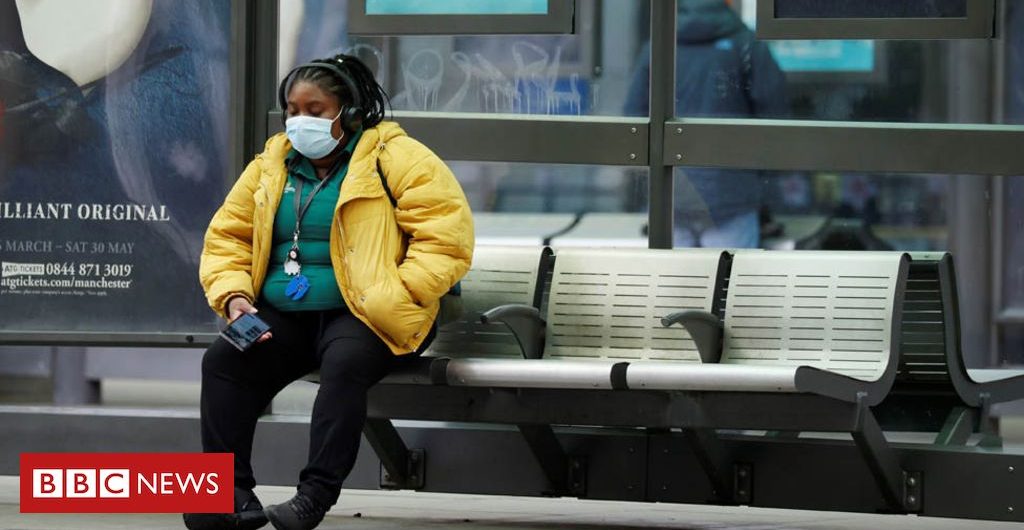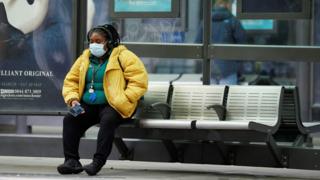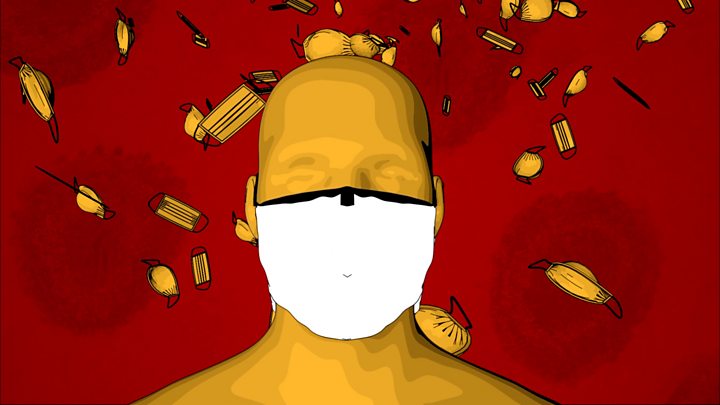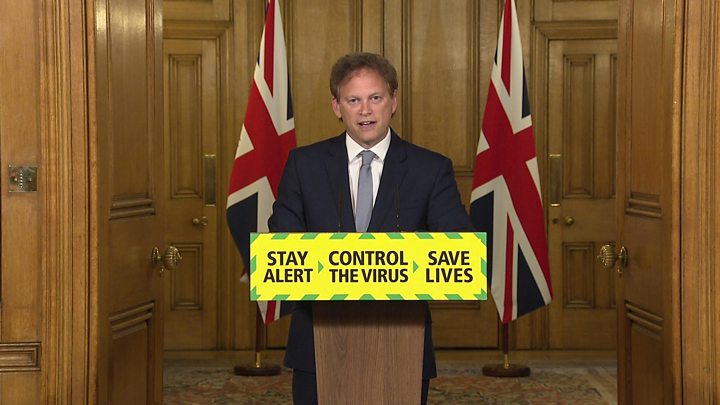- in Science
Science Coronavirus: Widen rules on where face coverings must be used, say UK doctors

Science
 Image copyright
Image copyright
Reuters
Some people across Britain, including here in Manchester, already choose to wear masks
Doctors have urged the government to make face coverings compulsory in all places where social distancing is not possible, not just on public transport.
All passengers on public transport in England must wear a covering from 15 June, the government said on Thursday.
But the British Medical Association, the doctors’ union, said masks “should not be restricted” to transport.
It also said the risk from coronavirus would be “much less” if the rule started now, not later in the month.
Face coverings – which can be homemade – must be worn on buses, trams, trains, coaches, aircraft and ferries.
Passengers will not be allowed to travel without one, and if they do not wear one they could be fined.
Very young children, disabled people and those with breathing difficulties will be exempt.
The current guidance in England, which has been in place since last month, advises people to wear face coverings in enclosed spaces where social distancing is not always possible, such as in some shops.
People in Scotland and Northern Ireland are also currently advised to wear coverings in places where social distancing is more difficult, while the Welsh government says it is a matter of personal choice.
Transport Secretary Grant Shapps said the new measure comes as passenger numbers are expected to increase when lockdown measures are eased further.
From 15 June in England, secondary schools and colleges will open to some students, while shops can reopen if they put social distancing measures in place.
Defending the decision not to make face coverings mandatory on public transport until mid-June, Mr Shapps said the evidence of their benefits was “marginal” – and that so far the transport system had only been at 5% capacity.
He told the BBC the move was “not some panacea” but provided “some reassurance to passengers”.
Mr Shapps said wearing face coverings in shops was not being made compulsory because people were less likely to be near to somebody else for a long period of time.
Science Doctors’ warning
The BMA said in April that the government should consider asking people to cover their faces whenever they leave home.
BMA council chair Dr Chaand Nagpaul said the new rule to wear face coverings “should not be restricted to public transport but to all areas where social distancing is not always possible”.
He also said the government should ensure the public are supplied with face coverings, as well as providing advice on how to wear them correctly.
However, charities have previously raised concerns that face coverings make communication more difficult for people who are deaf or have hearing loss and rely on visual cues such as facial expressions and lip-reading.
Scotland’s First Minister Nicola Sturgeon said her government was considering whether to make it mandatory to wear face coverings in some situations.
Image copyright
Getty Images
Staff at some shops that have already opened, like car dealerships, are wearing masks
A further 1,806 cases of coronavirus were confirmed in the UK on Thursday. The number of people who have died with the virus rose by 176, taking the total number of deaths to 39,904.
At Thursday’s daily coronavirus briefing, Mr Shapps said that people in England should wear the kind of face covering that could be made at home, to keep surgical masks for medical and care staff.
They should cover the mouth and nose and can be as simple as a scarf or bandanna tied snugly behind the head.

Media playback is unsupported on your device
Transport operators will be able to issue penalty fines for those who do not follow the rules, in a similar way to people who travel without a ticket. Officers from the British Transport Police will help to enforce the measures.
London Mayor Sadiq Khan said there would be an “element of discretion and good faith” when it came to enforcing the policy but he was confident most people would follow the rules voluntarily.
Mr Shapps also stressed that social distancing and regular hand washing were still the most important measures to prevent the disease spreading.

Media playback is unsupported on your device
The World Health Organization (WHO) currently says the only people who should wear protective masks are those who are sick and showing symptoms, and those caring for people suspected to have virus.
The WHO does not usually recommend masks for the public because they can be contaminated by other people’s coughs and sneezes, or when putting them on or taking them off – and they might offer a false sense of security.
Science ‘A potentially useful extra tool’
Research on face coverings has been described as “slim” by many authorities, and for health professionals there’s always been the fear of a rush to snap up medical-grade masks.
But studies in laboratories have shown not only how far droplets can be spread by coughs but also how various kinds of materials can dramatically reduce how many of those droplets do get through.
For the US government, the deciding factor was the risk of the virus being spread by people who do not realise they are carrying it.
For others, it’s been a sense of altruism: A homemade mask will not do a great job of protecting you but may reduce the chances of you infecting others.
And if enough people follow that advice, the risks of the infection spreading are brought down.
There have been passionate disagreements over this within the world of science.
And even advocates would agree that the public wearing masks will not defeat the virus on its own; but it’s a potentially useful extra tool as we come out of lockdown.
Unions had been pushing for compulsory face coverings after dozens of transport workers died after contracting Covid-19.
Mick Cash, of the Rail, Maritime and Transport union, said the new rules were “long overdue”.
Labour said it was “another example of the government being slow to act”, after the party backed London Mayor Sadiq Khan’s call for face masks two months ago.
Science How to make your own face mask
Don’t have a bandana? Click here to find out how to make other face masks.
